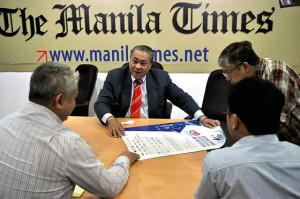China’s state-owned Beijing Automotive Industry Holding Co., Ltd. (BAIC) said it will be making its official Philippine launch under a local joint venture known as Bayan Automotive Industries Corp. at the 2014 Campi Philippine Motor Show (PIMS), which opens today at the World Trade Center Manila.
The newly-formed venture, which will also bear the acronym BAIC, will present five vehicle models to the public at the Campi show, BAIC Philippines Chief Executive Officer Commodore George Chua explained at a roundtable meeting earlier with The Manila Times news team.
The five models are the A113/A115 4-door hatchback, A523T luxury sedan, X424 SUV, Wevan small van, and the BJ5030 full-sized van.
“BAIC has categories for small car, big car, and the off-road SUV,” Chua said.
“The constant theme here is to give something more to the consumer than what they expect. A tagline which I thought of is, ‘Imagination into Reality.’ Pangarap ‘yan. Lahat tayo nangangarap, [It’s a dream. We all have a dream,]” Chua said.
“We are giving the Filipino consumer a Chinese product that can be synonymous with quality and affordability,” he added.
In China, BAIC is a manufacturing partner of Daimler AG, building the Mercedes-Benz C-Class and E-Class models, and several Hyundai models for the Chinese market.
Chua described the new Chinese car models through an acronym: “BAIC stands for: Beauty because of their beautiful design, Affordability, Innovation, and Comfort.”
Chua was dismissive of the effects of territorial disputes between the Philippines and China, and told the Times that if the Philippines were to wait until the issues were resolved, there would be “no more business.”
“Those issues, we shouldn’t even be taking care of [them]. We are not the government; we’re not ambassadors—that’s not our mandate. To me, I cannot tell what the president is supposed to do,” Chua said.
“Based on my experience, they [the Chinese] are very open-minded. They don’t have any issues with respect to politics. Everybody wants to have a thriving business relationship because once you have good business relationships, your economy improves, your people improve, and everybody is happy,” he said.
“What we’re saying is this is a good product, Filipinos can make good use of it, should we deprive Filipinos of that product? Should we close down 168 [the mall in Divisoria] and deprive Filipinos of products they can afford? Ano pang mangyayari sa mga “yan? Ano pang mabibili mo? [What would happen to those products? What else could you buy?]” he added.
BAIC is currently operating only as a distributor in the Philippines, although Chua said the next step to developing vehicle production capabilities depends on how fast the market will react to the new Chinese auto brand.
“We’re just looking at possible potential. We would like to exert all our efforts in the Philippines first before we move outside. So we need to be able to achieve certain critical volumes to show that there is potential,” he said.
Chua is confident that BAIC can stand up to stiff competition in the Philippine auto industry.
“Since we are going mainstream, we feel that in one year, we can uplift the market. We should be there. We feel that the consuming market is now more educated. With the advent of the internet, they can check so many websites and auto reviews,” he said.
“Eventually BAIC will go into the commercial segment. We feel that the commercial segment needs to be properly serviced well also. Yung mga light trucks. Hopefully magdevelop ang Pilipinas at magkaroon ng mas maraming trabaho ang Pilipino [The light trucks . . . hopefully the Philippines would develop further and create more jobs for the Filipinos].”
“Businesses typically get into all kinds of trouble because they use karag-karag vehicles.
This creates a lot of destruction in the supply chain. What we would like to offer is ‘if I can improve your transport efficiency, then mas gaganda ang negosyo mo,’” Chua explained.
Chua also said the car line would be developing LPG-fueled vehicles for the Philippines.
“We just start with the cars first and then we’ll do the LPG, because with the LPG, we can also do that for trucks,” he said.
“After the PIMS, hopefully within the year we would be able to get started on the LPG systems,” Chua added.



